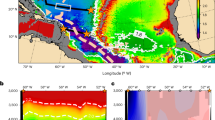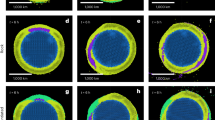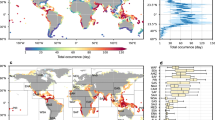Abstract
THE formation of a microwave duct over the sea has been examined in terms of a distribution of potential refractive index (refractive index independent of height in an adiabatic atmosphere) corresponding to a functional relationship originally suggested by Deacon1 to describe the distribution of certain meteorological properties in the boundary layer. Deacon's relationship takes the stability of the atmosphere into account in terms of a profile index, β, which is a function of air−sea temperature difference and wind velocity.
This is a preview of subscription content, access via your institution
Access options
Subscribe to this journal
Receive 51 print issues and online access
$199.00 per year
only $3.90 per issue
Buy this article
- Purchase on Springer Link
- Instant access to full article PDF
Prices may be subject to local taxes which are calculated during checkout
Similar content being viewed by others
References
Deacon, E. L., Quart. J. Roy. Meteor. Soc., 75, 89 (1949).
Schelkunoff, S. A., Bell Telephone Lab. Rept., MM–44–110–53 (July 1944).
Jones, R. F., Nature, 163, 639 (1949).
McPetrie, J. S., and Starnecki, B., Nature, 162, 818 (1948).
Author information
Authors and Affiliations
Rights and permissions
About this article
Cite this article
ANDERSON, L., GOSSARD, E. Oceanic Duct and its Effect on Microwave Propagation. Nature 172, 298–300 (1953). https://doi.org/10.1038/172298b0
Issue Date:
DOI: https://doi.org/10.1038/172298b0
Comments
By submitting a comment you agree to abide by our Terms and Community Guidelines. If you find something abusive or that does not comply with our terms or guidelines please flag it as inappropriate.



